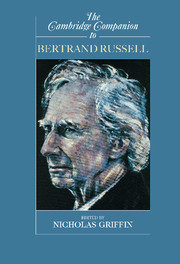Book contents
- Frontmatter
- Introduction
- 1 Mathematics in and behind Russell’s Logicism, and Its Reception
- 2 Russell’s Philosophical Background
- 3 Russell and Moore, 1898-1905
- 4 Russell and Frege
- 5 Bertrand Russell’s Logicism
- 6 The Theory of Descriptions
- 7 Russell’s Substitutional Theory
- 8 The Theory of Types
- 9 Russell’s Method of Analysis
- 10 Russell’s Neutral Monism
- 11 The Metaphysics of Logical Atomism
- 12 Russell’s Structuralism and the Absolute Description of the World
- 13 From Knowledge by Acquaintance to Knowledge by Causation
- 14 Russell, Experience, and the Roots of Science
- 15 Bertrand Russell
- Selective Bibliography
- Index
- Series list
13 - From Knowledge by Acquaintance to Knowledge by Causation
Published online by Cambridge University Press: 28 May 2006
- Frontmatter
- Introduction
- 1 Mathematics in and behind Russell’s Logicism, and Its Reception
- 2 Russell’s Philosophical Background
- 3 Russell and Moore, 1898-1905
- 4 Russell and Frege
- 5 Bertrand Russell’s Logicism
- 6 The Theory of Descriptions
- 7 Russell’s Substitutional Theory
- 8 The Theory of Types
- 9 Russell’s Method of Analysis
- 10 Russell’s Neutral Monism
- 11 The Metaphysics of Logical Atomism
- 12 Russell’s Structuralism and the Absolute Description of the World
- 13 From Knowledge by Acquaintance to Knowledge by Causation
- 14 Russell, Experience, and the Roots of Science
- 15 Bertrand Russell
- Selective Bibliography
- Index
- Series list
Summary
People are not so different from gramophones as they like to believe
(AMi: 166).There are many familiar themes in Russell's repertoire, but his later discussions of knowledge include many insights which have received little notice. Indeed, it is often supposed that in the years after 1914, after the heroic foundational phase of analytical philosophy celebrated in countless anthologies, Russell ceased to engage in creative philosophy and turned instead to popular tracts on marriage and morals, idleness and happiness. One thing I want to show here is that during these years Russell was in fact developing a new conception of epistemology, linked to a new philosophy of mind, which was so far ahead of his time that it passed by largely unappreciated. It is only now that our own philosophy of mind has caught up with the 'naturalisation' of the mind that Russell was teaching from 1921 onwards that we can recognise in his later writings the central themes of our current debates - concerning the significance of the causation of belief, the tension between 'externalist' and 'internalist' perspectives concerning knowledge, and the limits of empiricism.
To discuss these later themes properly, however, we have to start from a discussion of the tensions inherent in his earlier epistemology, and the text from which to start is his famous ‘shilling-shocker’ The Problems of Philosophy (1912), in which Russell presents a general survey of the subject grounded in a theory of knowledge.
- Type
- Chapter
- Information
- The Cambridge Companion to Bertrand Russell , pp. 420 - 448Publisher: Cambridge University PressPrint publication year: 2003
- 11
- Cited by

